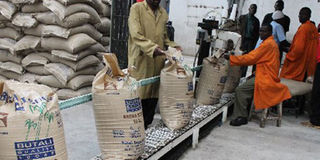Citizens of EAC need lessons in integration

Workers packaging sugar at Butali Sugar Mills in Kakamega. This, perhaps, explains why the sugar debate is now safely in the sea of forgetfulness and we are no longer talking about what was dubbed presidents Uhuru Kenyatta and Yoweri Museveni’s sugar. PHOTO | ISAAC WALE | NATION MEDIA GROUP
What you need to know:
- However, we have not done a good enough job of keeping the region’s citizens informed about the integration process and what it means for them.
- There is now in place the East Africa Single Tourism Visa for foreign visitors and the East African Identity Card that allows citizens to move freely across the region without requiring a national passport.
It is claimed that Kenyans have a maximum attention span of two weeks.
This, perhaps, explains why the sugar debate is now safely in the sea of forgetfulness and we are no longer talking about what was dubbed presidents Uhuru Kenyatta and Yoweri Museveni’s sugar.
The government did a poor job of explaining the real position about what did or did not happen.
Unfortunately, it has continued to do so on many issues regarding the regional integration agenda.
There is dire need among not just Kenyans but all the region’s citizens for a clear, sober, and consistent education process concerning the regional integration agenda — what regional integration is all about, what it involves, and what that means for the daily lives and opportunities as well as sacrifices that must be made to make integration work.
Consider this: We were recently all up in arms when Kenya Airway’s weekly flights to Tanzania were reduced from 42 to 14 and then protested when Uganda wanted to sell its sugar to Kenya.
The truth of the matter is that we are all now “citizens without borders” because we live in a regional economic bloc.
We must embrace this as the new normal. It is the era of integration.
The EAC came back into being in 2000.
A lot has since been achieved, including a Customs Union and now a Common Market that is under way.
However, we have not done a good enough job of keeping the region’s citizens informed about the integration process and what it means for them.
As a result, the people see the integration agenda as the preserve of their presidents and the clique in power.
While a lot is agreed upon at the regional level, in terms of what can benefit the citizens, the trickle-down process has been minimal.
It is, therefore, not surprising to find a Customs official charging a trader for a commodity that should not attract duty at all.
COMMENDABLE PROGRESS
Due to ignorance and lack of access to key information, integration has not achieved its maximum benefits.
Still, significant progress has been made.
There is now in place the East Africa Single Tourism Visa for foreign visitors and the East African Identity Card that allows citizens to move freely across the region without requiring a national passport.
The question is, how many citizens are aware of this and many other benefits including, for example, the fact that one can acquire investment land in Kigali within two days?
With the region now moving quickly towards a monetary union and ultimately a political federation, the least that one would desire is opposition from citizens because they are not appropriately informed.
Knowing that the region is home to a cocktail of cultures and ethnic groups, it is vital that the member states move quickly to ensure unity and strengthen the capacity to accommodate one another, including diversity of opinion first at the national, and eventually, at the regional, level.
If this is not done, then the whole intended federation might as well wait.
You do not want to export cheap local politicking and ethnic profiling and differences to the region.
At the end of the day, a well-informed citizenry is the best ambassador of regional integration.
After all, integration should be about the people and for the people, not just their leaders.




